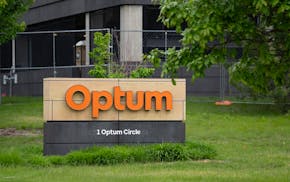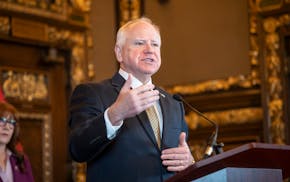Along a busy stretch of highway in Waconia, car after car will pull off to make their way through a drive-thru.
These drivers aren't headed toward the McDonald's, Taco Bell or Caribou Coffee. Their destination: the Sota Shine car wash, which whisks dirty vehicles through a tunnel of technicolor suds.
From Andover to Zimmerman, it seems no suburban strip mall is without a car wash. And more than ever, it's likely a high-tech, fully automated operation based on subscriptions purchased by people like Tom Smith, a carpenter from Young America.
"Once you start going, it becomes like an obsession to get my money's worth," Smith said. "If I don't go through for a while, I'll go through twice."
Smith pays $97.54 each month for his Unlimited Wash Club membership at Sota Shine so he can wash his two pickup trucks, his wife's SUV and even Izzy, the couple's 97-pound Mastiff pooch, whenever he wants. Sota Shine's new Maple Grove location has a self-serve dog wash, added to set the local chain apart from national competitors.
Smith isn't alone, it seems. There are now 60,000 car washes nationwide — twice the number of Starbucks, Chick-fil-A and McDonald's locations combined — according to Matthews Real Estate Investment Services, a national brokerage that tracks the industry.
Analysts said the rapid expansion of tunnel, or conveyor-style, washes has to do with the subscription model — popular for everything from Netflix to meal services — that offers convenience through continuous and unlimited access.
The American infatuation with drive-thru establishments is another factor. The trend, analysts said, is rapidly expanding a cultural phenomenon that gained even more traction during the pandemic.
"We live in a drive-thru society," said John Lai, CEO of Mister Car Wash, the nation's largest car wash chain. "People like to sit in their vehicles, and we as Americans are obsessed with speed."
The publicly traded company now has more than 500 locations nationwide, including 30 in the Twin Cities metro.
"Getting a car wash becomes part of the everyday routine," said Dean Ngo, Mister's director of Midwest operations, "like stopping to get a cup of coffee."
Starts and stops
While there's no nationwide data available for the proliferation of car washes in recent years, the Federal Reserve Bank of St. Louis has tracked revenue from car washes and clocked a dramatic surge during the pandemic years. In 2022, consumers spent more than $16 billion on car washes, nearly twice as much as just six years earlier.
Mister's newest Minnesota wash opened recently on Hwy. 7 in Minnetonka, sporting uniformed workers, three of four lanes reserved for members and customer service as a top priority.
Employees must greet every customer — including a reminder that a subscription is only a bit more expensive than a single wash — and clean the bathrooms every three hours.
Lai said the company has grown 25% in the Twin Cities since the pandemic, and although higher interest rates and construction costs have slowed expansion recently, Mister and several others are actively on the hunt for new sites.
"The last five years have been insane," Lai said. "We still see the Twin Cities as an underserved market."
That's an unfathomable statement in some metro communities, where lawmakers have passed development moratoriums to stop the rapid increase of car washes.
In Blaine, for instance, a six-month moratorium aimed to give the city time to evaluate its zoning regulations. In one small section of the suburb, there are already nearly 20 car washes of various sorts, including a Tsunami Express, a Mister and a Silverstar.
"This is a specialty sector that has blown up," said Brett Draxler, a senior associate at Transwestern who is scouting more sites for Sioux-Falls based Silverstar.
Ideally, the company wants to double the number of car washes in the Twin Cities in the next 12 to 18 months. For investors, though, conditions are far from ideal.
Draxler said finding suitable and affordable sites for tunnel washes is difficult. The average tunnel wash requires about an acre of land, which can easily fetch upward of $1 million. Construction can cost another $5 to $8 million.
"Were seeing crazy pricing to acquire these sites," Draxler said.
He and other brokers said proper zoning is another obstacle.
"If it was a Burger King or other drive-thru, those work really well because they don't have to be rezoned," he said.
Silverstar and other brands tout the environmental advantage of tunnel washes rather than DIY operations or washing at home with a bucket and hose. Modern tunnel washes have underground tanks that recycle the sudsy water. Developers are also installing more high-tech equipment and building more soundproofing structures to make car washes quieter. Some also use enclosed vacuum stations to reduce noise pollution, which can hamper permitting efforts.
Suzanne Schefcik, vice president of capital markets/investment sales for Colliers, said car wash development has slowed recently because sites have become so expensive, particularly in comparison to cheaper prices during the pandemic.
"There's a slim market for where you can put them," she said. "If you're a land owner and zoned for this land use, it's a gold mine."
She said many sites, though, require rezoning or a conditional-use permit.
"That can be a bit of a lift, especially in first- and second-ring suburbs," she said. "But there seems to one on every corner in the west metro."
Saturated market
In Eden Prairie, there are two Misters just a few hundred yards from one another. One of those another company built before Mister bought and rebranded it. Mister then decided to build a more state-of-the-art operation nearby.
"In the long run, they're just going to wipe each other out, just like self-serves did in the '80s and '90s," said Pat Shannon, president of the Heartland Carwash Association. "They're killing each other."
Shannon owns a Big John's Car Wash in Bellevue, Neb. He's watched the industry evolve from one dominated by self-serve washes. Those cost only $3 or $4 per wash compared to the more costly monthly subscriptions popular today.
He said there's still a place in the market for the in-bay washes like the one he owns because not everyone is willing to drop $16 to $20 dollars for the convenience of not leaving their car.
"That's the younger generation," he said. "They want it done fast, and they want to move on."
He thinks private equity, not unfettered demand, is what's really behind the car wash boom.
"We have so many people with money who have figured out that they're profitable," Shannon said. "So everybody wants to invest in them."
Garrett Farmer — a managing broker at NAI Legacy who has handled several car wash deals and is a car wash investor himself — agreed private equity has played a bit part in the industry's expansion.
"Wall Street loves subscription-based models," he said.
He also credits the 2017 Jobs Act, since investors were able to benefit from depreciation allowances especially favorable to them. If President Donald Trump's administration revives similar rules, Farmer expects another round of expansion.
Fresh ideas
Nick Netley, the owner of Sota Shine, said the competitive landscape is already challenging, so he's always thinking about how to compete with the nationals. Hence, the dog wash.
For about 15 years, he owned a doggie day care business, which he left after burnout had him seeking a new challenge.
His thought process: "I'm a car guy, and I love a clean car."
So in early 2022, after years of planning, he opened his first Sota Shine in Waconia. Then a Tidal Wave opened half a mile away.
"It's a sinking feeling when you're a little guy and you have a juggernaut open up down the street," he said.
His strategy for drawing customers: Offer services and quality others aren't.
A couple years ago, he spent nearly $1.7 million for a 1½-acre outlet in a Hy-Vee parking lot in Maple Grove. The new wash has an even longer tunnel plus the Sota Pup self-serve dog wash. That has six dog wash stations, drying rooms and a doghouse-style photo booth where pet owners can pose with their pups.
Netley said about 75% of car washes at his shops are from memberships, and most members are washing their vehicles three to four times a month. He's so confident customers will keep coming, he's already working on opening a third location.
"When people are spending $100,000 on a fancy SUV, they want it to last longer," he said. "People like clean cars; I feel dirty if my car is dirty."
Smith, one of Netley's best customers, agreed.
"It's like a reflection on you as a person. When you have a nice, clean vehicle, it makes you feel better," Smith said. "You look around and see everyone else's vehicle is dirty, but you're taking time investing in something you've paid so much for."

Delta hiked fares for solo travelers, until Twin Cities travel experts caught the change

In first speech back, UnitedHealth's new CEO pledges to review hot-button issues

A child had measles at Mall of America, concerning state health officials who don't know source

Ramstad: Gov. Walz, things are not getting done in Minnesota

